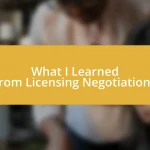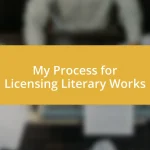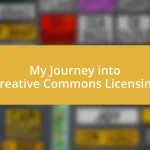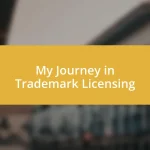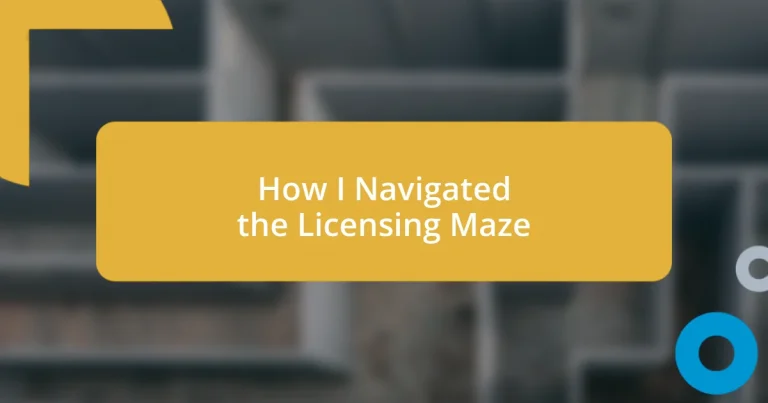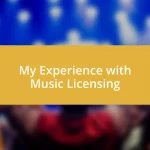Key takeaways:
- Understanding the types of licenses and specific industry requirements is crucial for compliance and successful navigation of the licensing process.
- Effective research strategies, such as checking state regulations, leveraging professional organizations, and networking, can significantly ease the application process and clarify requirements.
- Maintaining compliance is an ongoing responsibility that benefits from proactive planning, regular check-ins, and a supportive network for overcoming challenges.
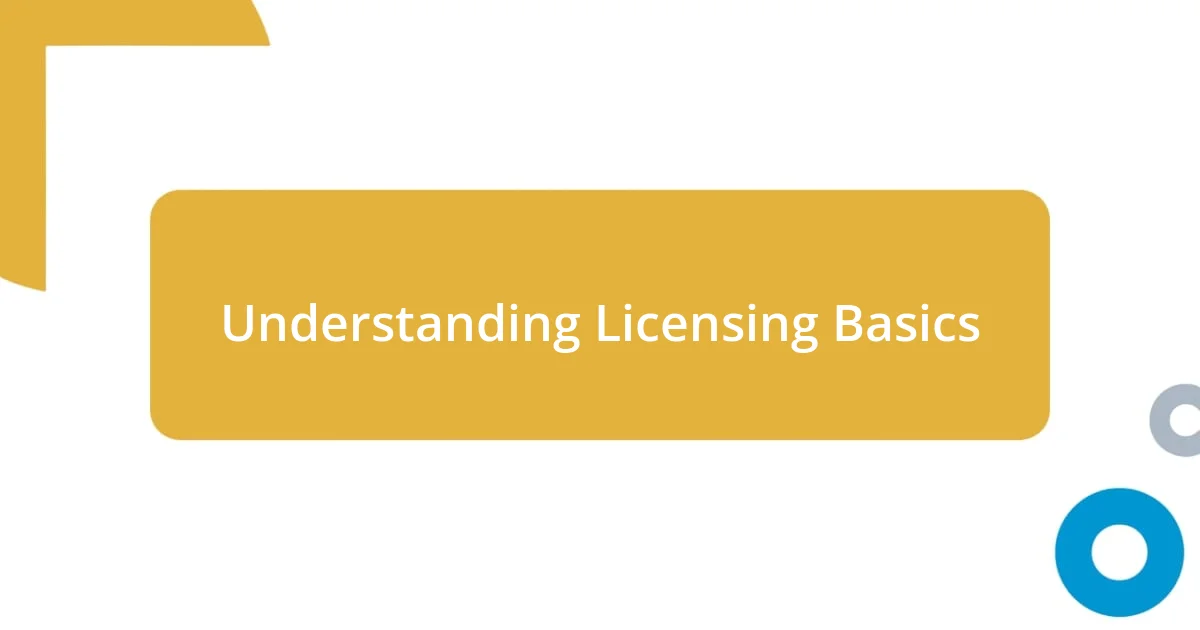
Understanding Licensing Basics
Licensing can feel overwhelming at first, but understanding its basics is crucial. I remember when I first encountered the licensing maze; it felt like each step forward took me two steps back. Have you ever found yourself lost in a sea of rules and regulations? That initial confusion is common, but don’t let it discourage you.
At its core, licensing is about permission—permission to operate within certain legal frameworks (and, let me tell you, each industry has its own set of rules). When I was starting my journey, I had to learn that licenses often come with specific requirements and limitations. This realization made me reflect: how can I ensure I’m fully compliant and not just crossing my fingers in hopes nothing goes wrong?
As I delved deeper, I discovered that different types of licenses exist for various purposes, like business, professional, and even creative licensing. It was an eye-opener! I often think, why isn’t this information more accessible? Understanding these distinctions helped me navigate the often-contentious waters of compliance, reinforcing the need to take a proactive approach to licensing from the beginning. How about you? Have you taken the time to explore the different types of licenses relevant to your field?
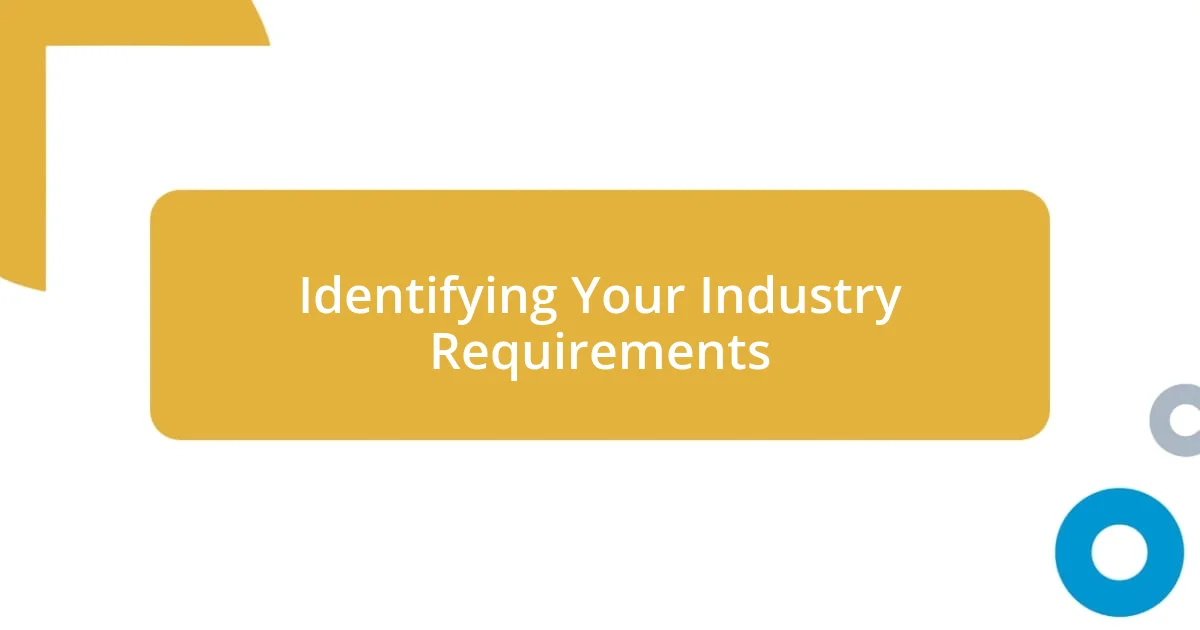
Identifying Your Industry Requirements
Identifying the specific requirements for your industry is often the first significant hurdle that many face in the licensing maze. In my experience, I found it crucial to list out all relevant regulations early in the process. For instance, when I was pursuing my licensing, I started by visiting state-specific websites and professional organizations. They all had a wealth of information that helped clarify what was needed to stay compliant. Have you explored these resources yet?
As I dug deeper, I realized that each industry has not only its own licensing authorities but also varying compliance timelines and document needs. At one point, I had to prepare a mountain of paperwork for my application, including additional proof of eligibility, and that felt daunting. It was overwhelming, but breaking it down into smaller, manageable steps made it more bearable, allowing me to tackle one requirement at a time. It’s a method that really worked for me—is breaking things down something you might find helpful too?
When organizing my findings, I created a helpful comparison table that laid out key elements at a glance. Trust me, this visual aid transformed my approach! It highlighted differences in licensing needs across related sectors and allowed me to strategize effectively. You might find that creating something similar offers you clarity for your own path. Why not give it a shot?
| Industry | Licensing Requirements |
|---|---|
| Healthcare | State certification and professional board exam |
| Construction | Permits, liability insurance, and bonding requirements |
| Food Service | Health department permits and food safety training |
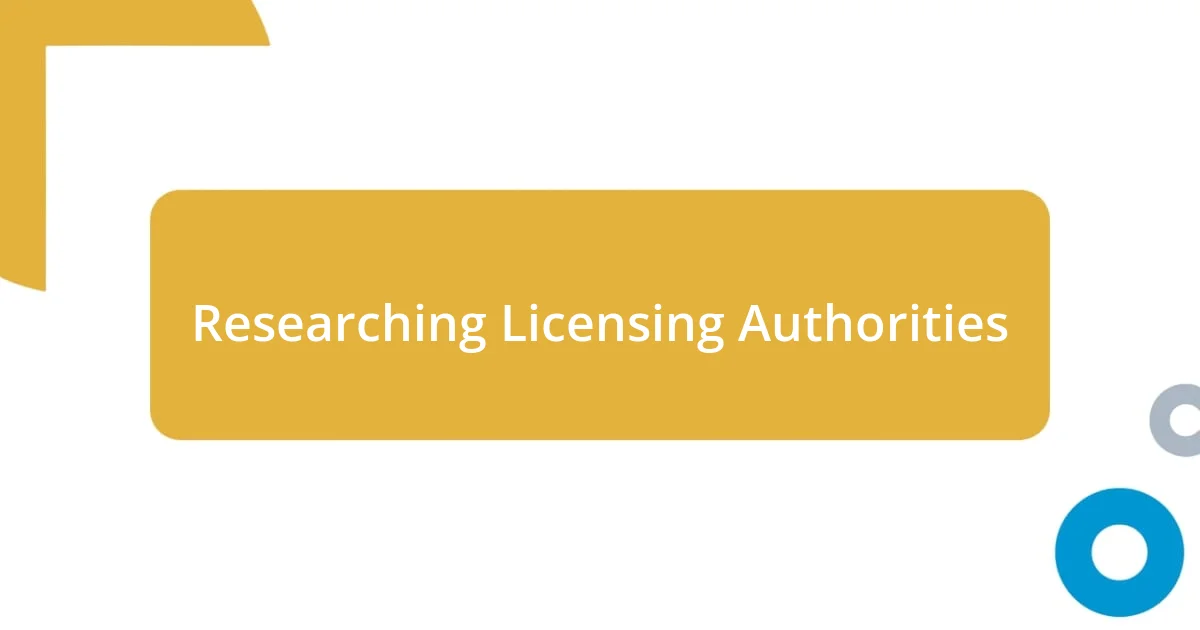
Researching Licensing Authorities
Researching licensing authorities is a step I learned to approach with both diligence and a sense of curiosity. In my early days, I often felt like I was wandering through a labyrinth, where each corner revealed another layer of complexity. One afternoon, I found myself in a lengthy phone call with an authority’s representative who patiently answered my many questions. That conversation not only alleviated my confusion but also ignited my excitement about what was required. Have you ever had a moment like that when a simple chat could change your outlook?
Here are some strategies that helped me when researching licensing authorities:
- Check State Regulations: I discovered that regulations can vary significantly from one state to another, so I always began my searches with state-specific websites.
- Leverage Professional Organizations: I reached out to associations pertinent to my industry; they often have a treasure trove of resources, including guidelines and contacts.
- Attend Informational Sessions: Many authorities hold workshops or informational webinars. I attended one, and the insights I gained were invaluable.
- Connect with Others: Networking can make a significant difference. Hearing firsthand accounts from peers was instrumental in guiding my approach and alleviating anxiety.
- Keep a Record: I created a spreadsheet, tracking contacts, deadlines, and requirements, which helped me stay organized and on top of my licensure journey.
In my pursuit, taking the time to immerse myself in the requirements not only clarified what I needed to do but also empowered me to take charge of my journey. It’s all about turning what feels chaotic into a structured plan, right? Have you mapped out how you’ll approach your own research?
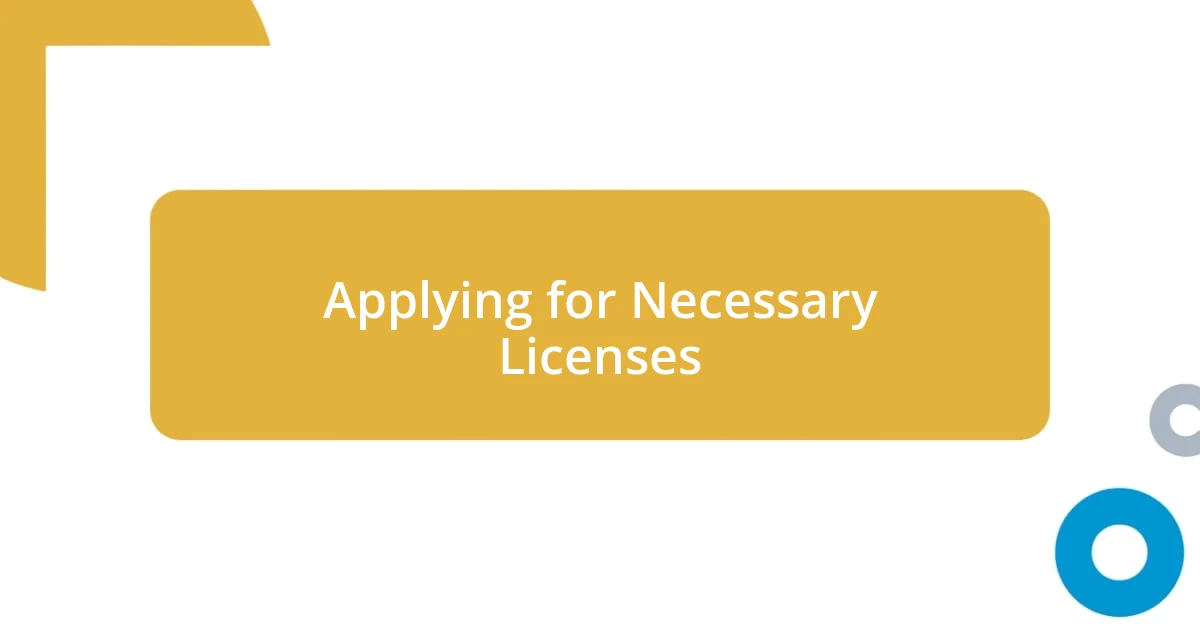
Applying for Necessary Licenses
Applying for necessary licenses can feel like climbing a mountain at times. I remember when I was ready to submit my first application; my heart raced, and a mix of excitement and anxiety washed over me. Each form seemed like a key to unlock a new door, yet the intricate details often caused me to second-guess myself. Did I fill out everything correctly? Have I attached all required documentation? It’s a small detail, but make sure to double-check every aspect, as missing even one signature could set you back significantly.
The application process itself can be cumbersome, but keeping a checklist proved invaluable to me. I found inspiration from someone in my network who had tackled a similar journey; they suggested creating a timeline for my documents. This tip helped me space out when to prepare and submit everything. I’ll admit, taking that proactive approach relieved a lot of pressure. Have you created a timeline for your licensing journey yet?
When I finally submitted my applications, there was this sense of liberation—you know, like releasing a breath you didn’t realize you were holding. I vividly recall pacing my living room while waiting for responses. It can be nerve-wracking! But just as I had learned to embrace the uncertainty, I realized this process taught me resilience. The waiting game is part of the journey. How will you manage the anticipation?
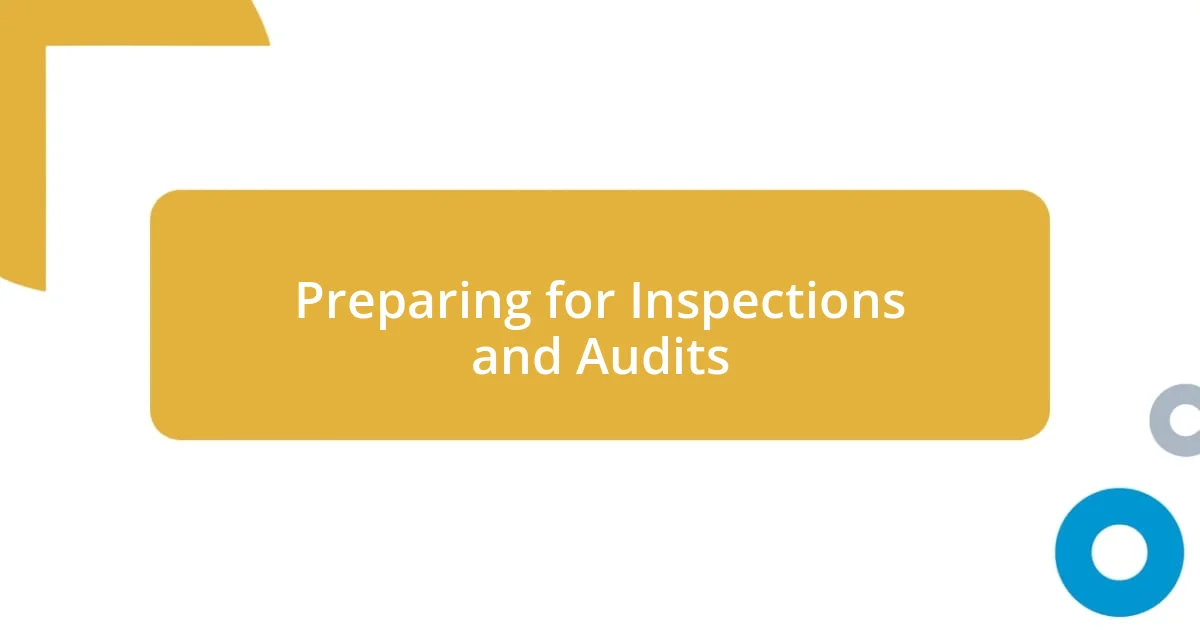
Preparing for Inspections and Audits
Preparing for inspections and audits can feel daunting, but I found that a little preparation can go a long way. I remember the knot in my stomach before my first audit, thinking about the scrutiny every corner of my work would face. To ease my nerves, I developed a thorough checklist ahead of time, focusing on what inspectors typically look for. This step transformed my anxiety into a focused sense of purpose, making me feel more in control. How do you typically prepare for high-stakes evaluations?
One of the most enlightening moments in my preparation was when I engaged with a mentor who had experienced several audits. They shared with me the significance of understanding the inspection criteria in advance. It felt like having a cheat sheet before an exam. I took their advice to heart and spent time researching common red flags that authorities tend to notice. I even conducted mock inspections with a trusted colleague to simulate the experience. That practice not only bolstered my confidence but also highlighted areas I needed to improve. Have you ever practiced for something to build your confidence?
On the day of the inspection, I walked in with a calm demeanor, equipped with my neatly organized documents and a positive mindset. To my surprise, the inspectors were approachable and opened a dialogue rather than just going through the motions. This human element changed the dynamic and turned what felt like a confrontation into a collaborative experience. In reflecting on that day, I realized that preparation isn’t just about checking boxes; it’s also about connecting with those involved. How can you shift your perspective on the upcoming audit to view it as a conversation rather than a test?
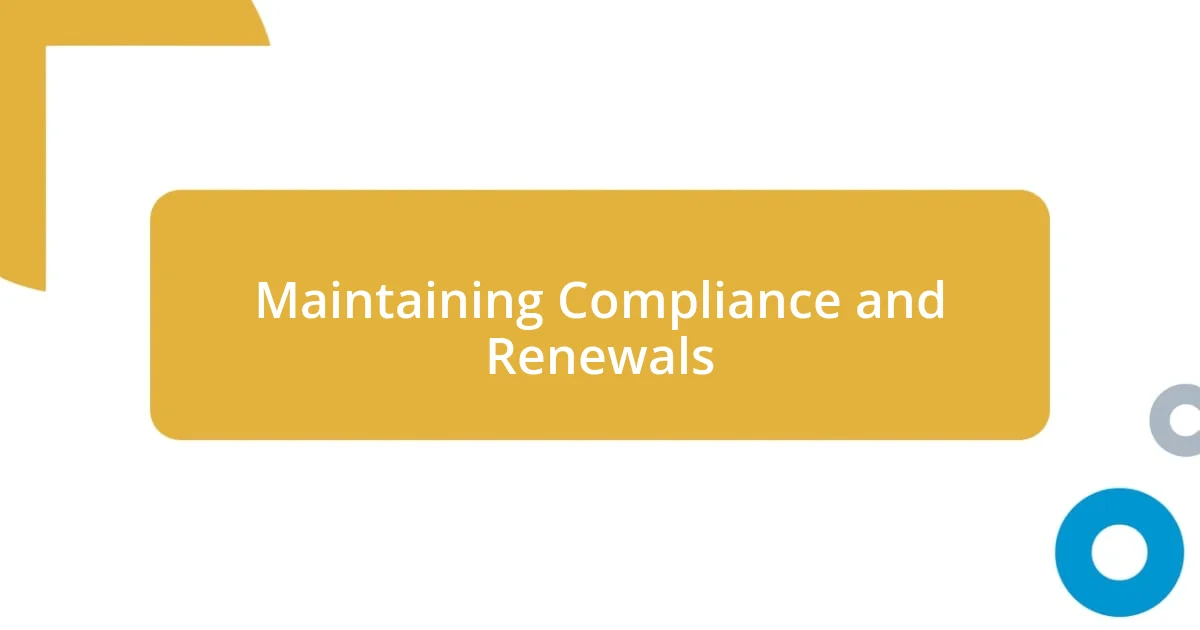
Maintaining Compliance and Renewals
Maintaining compliance and managing renewals are ongoing responsibilities that can easily feel overwhelming. I remember when I first started tracking my license renewals; it felt like juggling too many balls at once. Utilizing a digital calendar transformed my approach—setting reminders a month in advance gave me the breathing room to gather my documentation without rushing. How do you keep track of your deadlines to avoid last-minute scrambles?
One of the pivotal moments in my journey was realizing that compliance isn’t just about avoiding penalties; it’s about fostering a culture of accountability within my work. I created an internal checklist that mirrored licensing requirements, and this not only streamlined my process but also served as a training tool for new team members. I felt a sense of pride as I watched them grasp the importance of compliance, contributing to a smoother renewal process. What systems do you have in place to ensure everyone stays informed and involved?
I also learned that maintaining compliance is about being proactive rather than reactive. I once found myself scrambling to meet a renewal deadline, which left me frazzled instead of focused. Reflecting on that experience, I decided to establish regular compliance check-ins—not just as reminders, but as opportunities to assess and adjust my practices. Now, these check-ins feel like a necessary routine that keeps me grounded in my commitments. Have you thought about incorporating regular reviews into your own process to ensure peace of mind?
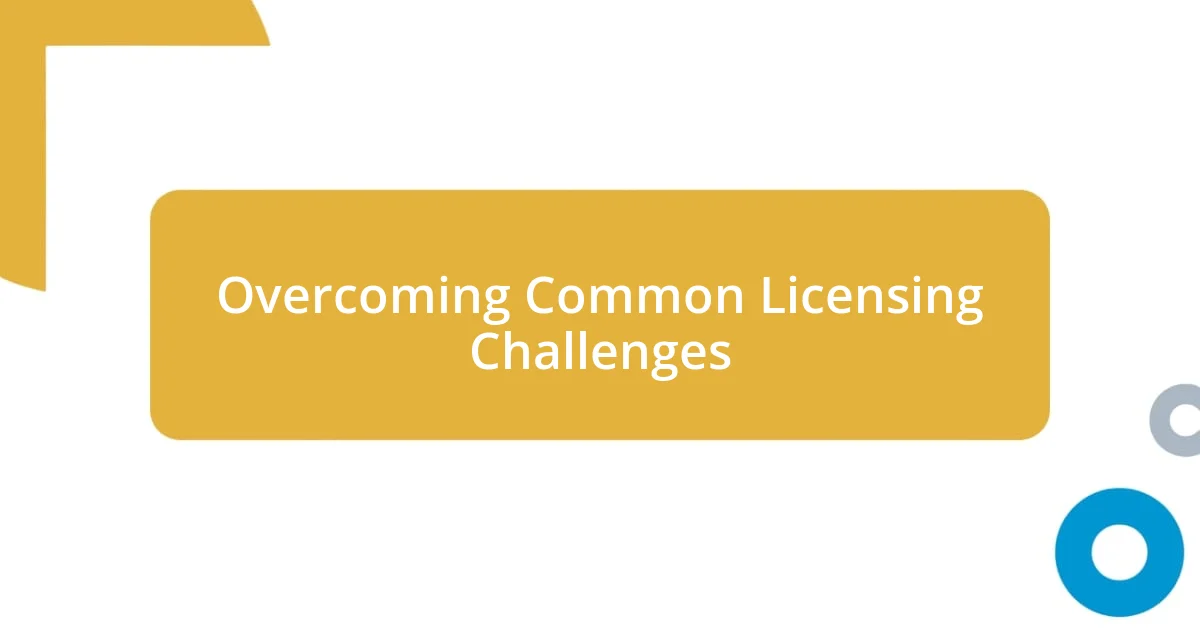
Overcoming Common Licensing Challenges
Navigating the maze of licensing challenges often feels like a test of endurance. One unforgettable moment for me was when I faced opposition from regulatory authorities due to incomplete submissions. I remember feeling frustrated and even a bit hopeless. To combat this, I decided to take a step back and truly understood what went wrong. I began to visualize the entire process as a learning curve rather than a hurdle. Isn’t it interesting how shifting our perspective can help us find solutions where we initially saw problems?
Another hurdle I encountered was keeping up with changing regulations. At first, I felt like I was racing against a clock that kept resetting. However, I started to subscribe to newsletters and follow relevant industry updates, creating a more proactive approach. This not only kept me informed but also turned knowledge into empowerment. I often reflect on how much easier it became to adapt once I embraced this new habit. Do you have a game plan for staying ahead of the curve regarding regulatory changes?
One crucial factor to overcoming licensing challenges is building a supportive network. When I sought out a group of peers who were also navigating similar waters, the sharing of experiences became incredibly valuable. I found comfort and inspiration in discussing common pain points and solutions with them. It was my friend’s insight on utilizing a centralized digital platform that streamlined our communication, saving us hours of confusion. Isn’t it incredible how collaboration can lighten the load?


